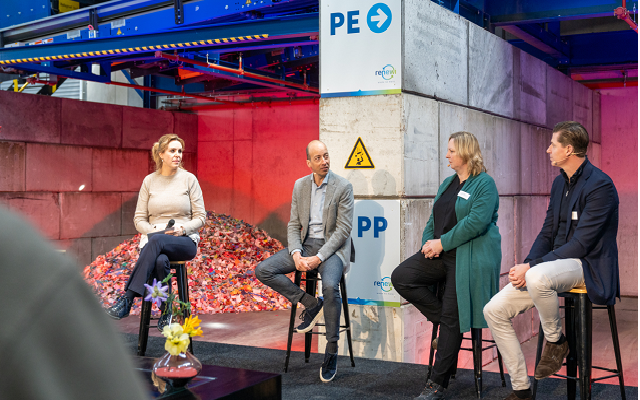Renewi ensures more and better recycling: new state-of-the-art plastic sorting plant
05 March 2024

Eindhoven, 4 March 2024 - Waste-to-product company Renewi today opened a new sorting plant for hard plastics in Acht, municipality of Eindhoven. The state-of-the-art sorting plant is expected to sort, grind and wash 24,000 tonnes of hard plastics annually. Thanks to the advanced technologies applied, Renewi can process even more hard plastics into new raw materials and with a higher quality. A purity of at least 95% for PP (“polypropylene”) and PE (“polyethene”) has now been achieved.
Present at the opening were Vivianne Heijnen, State Secretary for Infrastructure and Water Management, and Rik Thijs, Alderman for Climate, Energy, Land and Greening at the Municipality of Eindhoven. With a push of a button, the State Secretary opened the new sorting plant, followed by a guided tour.
More recycled plastics
Hard plastics are used in all kinds of products such as children's toys, garden furniture, electronics, cars, buckets, crates and containers. Only a third of all plastics collected in Europe are currently recycled. Time for change, argues Renewi.
The new installation enables the recycler to recycle not only separately collected plastics, such as a hard plastics mix from, among others, waste recycling centres, but also more contaminated hard plastics from construction and demolition waste.
The new sorting plant, which runs on 100% renewable electricity, replaces the old plant. Where previously 12,000 tonnes of hard plastics were processed at the Acht site, it is now expected to sort, grind and wash double the amount of hard plastics. Another added benefit is that the circular material coming from this line has significantly lower CO2 emissions than virgin material.
Plastic grinding with higher purity
At the new sorting plant, Renewi processes different types of hard plastics into no less than 18 separate streams. The main streams are PP and PE. Thanks to additional sorting and purification steps and advanced technologies, a purity for PP and PE of at least 95% is now achieved. This high purity increases the number of high-quality products in which the recyclate can be used in.
The plant is distinguished by smart use of various techniques such as material recognition with infrared light. All types of plastics are separated in one process simultaneously into recyclable monostreams. This combination ensures maximum separation and minimum contamination of the grinding material. With this, the company sets a new, better standard for buyers of hard plastics grinding materials.
Producers can use the recycled material to produce new, high-quality plastic products. For example, a discarded crate becomes a new crate again.
Improved laws and regulations
A panel discussion highlighted the importance of improved laws and regulations. To enable the transition to a circular economy, it is necessary, among other things, that material reuse and recycling receive sufficient attention. Unfortunately, many recyclable materials still end up in residual waste and are incinerated. Thus, they disappear from the economy and we remain dependent on scarce, primary raw materials. Moreover, virgin plastics are currently much cheaper than recycled plastics. Renewi believes there will be a stable and increasing demand for recycled materials when the use of a set percentage of recyclate in a product becomes mandatory by law.
A step closer to the circular economy
The opening of this facility will allow Renewi to recycle even more end-of-life plastics and make them suitable for reuse. The waste and recycling company therefore helps close the chain and reduces the volume that is landfilled or incinerated: another step towards realising the circular economy.

